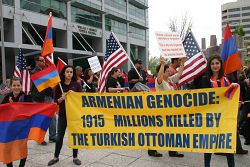Utah's Armenian community and friends gather to commemorate 100th anniversary of genocide
Friday, May. 01, 2015

Intermountain Catholic
+ Enlarge
The Armenian community in Utah demonstrates on the 100th anniversary of the Armenian genocide. IC photo/Christine Young
SALT LAKE CITY —Armenian adults dressed in black and children dressed in white marched in a peaceful demonstration, waving Armenian and American flags on the grounds of the Wallace F. Bennett Federal Building in Salt Lake City April 24, marking the 100th anniversary of the Armenian genocide.
The adults dressed in black to mourn the genocide victims.
On April 21, Governor Gary Herbert signed a proclamation declaring April 24 as Armenian Genocide Remembrance Day. The Armenian Western Diocesan Primate, Archbishop Hovanan Derderian, traveled to Utah for the historic day.
On April 23, the Armenian Apostolic Church canonized 1.5 million souls massacred during the Armenian genocide, launched by the Ottoman Turks 100 years ago. The ceremony was held outside of the world’s oldest cathedral, Holy Echmaiadzin.
“We want the world to recognize genocide,” Miriam McFadden, a spokesperson for the Utah Armenian community, said at the march. “Not just of the Armenian people, but genocide of people anywhere; we have to work toward peace and understanding with everybody, rather than hatred.”
“We know there are others besides us who have experienced genocide,” added Elly Goshgarian Muth. “We are speaking out today for everybody.”
In 1915, during World War I, the Ottoman Empire began a policy of ethnic cleansing of Christian minorities from central and eastern Turkey. Millions of Armenians, Greeks and Assyrians were killed; their homes and churches destroyed, resulting in their elimination from their ancestral lands.
On May 1, Saint Mark’s Episcopal Cathedral in Salt Lake City will hold an evening prayer service in memory of the victims of this first genocide of the 20th century 100 years ago, and of those today in the Middle East and Africa who are killed for being Christians. The date of May 1 is a week later than the official day of remembrance so as not to conflict with local services and events held on the 100th anniversary; this date also coincides with activities that are to be held at the Washington National Cathedral in Washington, D.C., the nation’s dedicated house of prayer.
“This service will recognize the victims of genocide and persecution. … We will offer prayers that this most horrible of evils will forever be banished from the landscape of humankind,” said the Very Rev. Raymond Joe Waldon, Dean of the Cathedral Church of St. Mark.
“Armenians are ecumenical in denomination and we want to remember those who were killed, but we don’t have a church of our own,” said McFadden.
Memory leads to healing, Pope Francis said during an April 12 Mass he concelebrated at the Vatican with Armenian Catholic Patriarch Nerses Bedros XIX Tarmouni in the presence of Catholicos Karekin and thousands of Armenian Catholics and Orthodox faithful. “Atrocities from the past have to be recognized, not hidden or denied, for true reconciliation and healing to come to the world,” the pope said.
During the April 12 Mass, which commemorated the Armenian genocide, Pope Francis handed a message to Catholicos Karekin that read in part, “May this sorrowful anniversary become for everyone an occasion for humble and sincere reflection, and for every heart to be open to forgiveness, which is the source of peace and renewed hope.”
The fact that those who died in 1915-1918 were Christians, both Orthodox and Catholic, is a sign of “the ecumenism of blood,” a unity that exists through common suffering, the pope said.
The Turkish government has criticized the pope’s use of the word “genocide;” Turkey’s position is that the deaths were caused primarily by disease, famine and casualties from the war.
“We want to thank Pope Francis for having the courage to acknowledge the atrocities committed toward my people and call it ‘genocide,’ said McFadden. “We celebrate 100 years of the Armenian genocide and survival of the people, and we are so pleased that the head of the Armenian Church canonized all those who perished in the genocide – 1.5 million.”
Also complimenting Pope Francis on his comments, the Rev. Yvonne Lee of the First United Methodist Church said, “Denial is not right. Denials of wrongdoings that happened 100 years ago or every day anywhere are sad. Denial is not good for anybody or for the world. What would the Turkish descendants say about their ancestors who did the wrong things and have denied them for 100 years? They may be ashamed.”
The Jewish Holocaust has been recognized in America “thanks to Hollywood, but many others have not, and until you have closure, you cannot heal well,” said Muth. “I would just like America to recognize that the Armenian genocide did take place so the survivors can heal.”
The Cathedral Church of St. Mark, 231 East 100 South, Salt Lake City, will recognize the 100th Anniversary of the Armenian Genocide at 7 p.m. on Friday, May 1 with a candlelight service of remembrance and prayer. This is an ecumenical service and will be open to the public.
For questions, comments or to report inaccuracies on the website, please CLICK HERE.
© Copyright 2024 The Diocese of Salt Lake City. All rights reserved.
© Copyright 2024 The Diocese of Salt Lake City. All rights reserved.

Stay Connected With Us